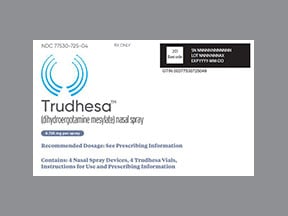
Trudhesa Coupons & Savings Card – Discount Prices from $1229.11
My prescription
Edit
1ML of 0.725MG/ACT, Trudhesa (1 Inhaler)
Select pharmacy

CVS
$1229.11
COUPON PRICE
Walmart
$1258.27
COUPON PRICE
Walgreens
$1269.26
COUPON PRICE
Albertsons
$1277.38
COUPON PRICETrudhesa savings card
Show this card to your pharmacist
CVS
$1229.11
BIN
ID
PCN
GRP
019876
LH1BCA40F0
CHIPPO
LHX
Powered by
Related ergot derivatives prescriptions
More prescriptions for migraine
Related ergot derivatives prescriptions
More prescriptions for migraine
Price history for Trudhesa
1 Inhaler, 1ML of 0.725MG/ACT
Average retail price for Trudhesa
Average SaveHealth price for Trudhesa
Our price history data is based on aggregated prescription data collected from participating pharmacies in America. Our prescription data updates daily to reflect the latest price changes. If you notice a missing data point, it means there wasn't sufficient data available to generate a monetary value for that date.
*Retail prices are based on pharmacy claims data, and may not be accurate when we don't have enough claims.
Trudhesa dosage forms
Dosage Quantity Price from Per unit 1ML of 0.725MG/ACT 1 Inhaler $1229.11 $1229.11 1ML of 0.725MG/ACT 2 Inhalers $2439.92 $1219.96 1ML of 0.725MG/ACT 3 Inhalers $3650.74 $1216.91
| Dosage | Quantity | Price from | Per unit |
|---|---|---|---|
| 1ML of 0.725MG/ACT | 1 Inhaler | $1229.11 | $1229.11 |
| 1ML of 0.725MG/ACT | 2 Inhalers | $2439.92 | $1219.96 |
| 1ML of 0.725MG/ACT | 3 Inhalers | $3650.74 | $1216.91 |
What is Trudhesa used for?
Trudhesa is used for the acute treatment of migraine with or without aura in adults.
How much does trudhesa cost?
The cost of Trudhesa can vary depending on factors such as the pharmacy, location, insurance coverage, and any available discounts or patient assistance programs. It is recommended to check with local pharmacies or consult with a healthcare provider or insurance company for the most accurate and up-to-date pricing information.
How much is trudhesa without insurance?
The cost of Trudhesa without insurance can vary depending on the pharmacy and location. On average, it may range from $500 to $600 for a supply of four nasal spray units. It's advisable to check with local pharmacies for the most accurate pricing. Additionally, patients may explore manufacturer discounts or patient assistance programs to help reduce the cost.
Does Trudhesa make you sleepy?
Trudhesa, which contains dihydroergotamine, is not typically known to cause sleepiness as a common side effect. However, individual reactions to medications can vary, and some people might experience drowsiness. If someone experiences unusual side effects, they should consult their healthcare provider.
Is Trudhesa available in the USA?
Yes, Trudhesa is available in the USA. It is a prescription medication used for the acute treatment of migraine with or without aura in adults.
